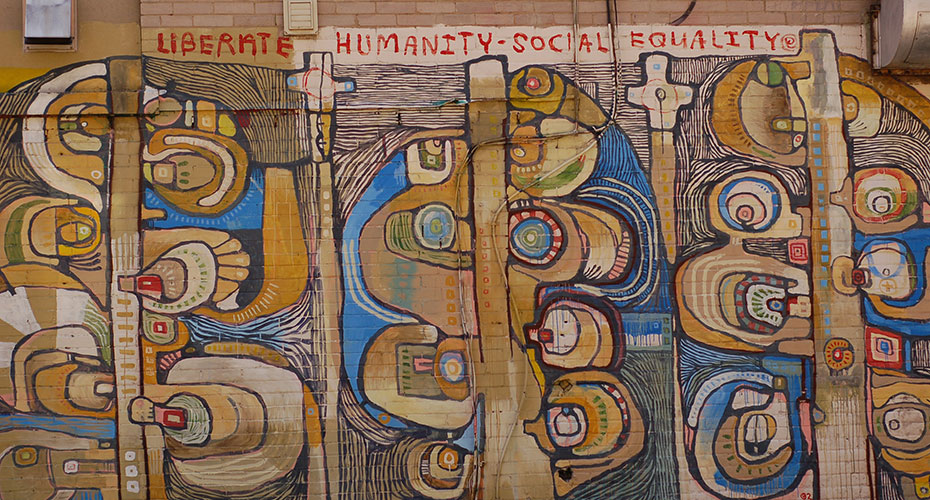Social Equalities: Health, Wellbeing and Communities
The Covid pandemic has highlighted the disproportionate ways in which social inequalities impact on health, wellbeing and communities. This includes regional and place-based inequalities within the UK as well as those associated with class, race and gender. In the Centre for Political Thought, we undertake research that seeks to understand how conditions for social equalities can be created, repaired and sustained. Our work is distinctive in the ways that it is shaped by contemporary theories, including complex systems and theories of radical participatory democracy. We are committed to engaged research, and more specifically, to co-creating knowledge with communities traditionally excluded from academic research.
 |
Dr Robin DurieRobin Durie's research interests lie in continental political philosophy and public policy. He has expertise in the history of phenomenology, as well as the writings of Bergson and Deleuze, and has published work on problems of time, change and difference. Based on primary research in complexity theory, he has investigated processes of change in the National Health Service, alongside processes of social and urban regeneration as a founding member of the Connecting Communities [C2] programme. With C2, he is currently collaborating on a major new initiative with the Scottish Violence Reduction Unit in Glasgow. He has received EPSRC funding to investigate the themes of 'sustainability', and the evolution of artificial culture, from the perspective of theories of emergence. He was the Academic Lead for the RCUK-funded Exeter Catalyst for Public Engagement, and is currently Director for Engaged research at the Wellcome Centre for Cultures & Environments of Health. He is a member of the Lancet Commission investigating The Value of Death, the Report of which is due to be published in late 2021. |
 |
Dr Andrew SchaapAndrew Schaap’s main area of research is contemporary political theory. His book Political Reconciliation drew on the thought of Hannah Arendt to conceptualize reconciliation as a political undertaking in societies divided by a history of state violence. His is broadly interested in theories of radical democracy, and particularly in the politics of migration, racism and anti-racist politics, political struggles of indigenous peoples, transitional justice, politics and literature, and political thought of the twentieth century. |
 |
Dr Karen ScottKaren Scott’s research interests focus on the politics of knowledge and epistemic injustice, particularly where it relates to evidence for public policy and sustainability. She has worked in, and alongside, local and central government to improve evidence for public policy on wellbeing and sustainability issues. Dr Scott is co-editor for the Palgrave MacMillan book series The Politics and Policy of Wellbeing, and also teaches various courses in the theories and governance of ‘The Good Life’ from classical to contemporary times. |
|
|
Dr Kate Goldie TownsendKate Goldie Townsend is a normative political theorist who takes an interdisciplinary approach to interpreting social and political phenomena. She is particularly interested in injustices affecting children and women. She tries to make sense of the world as it is, and to respond to injustices with feasible ideals; her work is methodologically feminist in this respect. Townsend is currently working on two research projects. The first project has two main aims: to defend all children’s right to genital integrity; and to expose moral inconsistencies in current legislation on child genital cutting. The second project examines the normative and political tensions that emerge if both children’s rights and women’s rights are taken seriously within the context of increasing reliance on science and experts to decide policy and inform public morality. She is particularly interested in how scientifically informed understanding about what is in children’s (including foetuses’ and infants’) interest, impacts on norms and policies concerning perinatal women’s bodies. |
 |
Dr Joanie WillettJoanie Willett’s research experience focuses on the inter-relationship between identity, communities, and the environment; using political philosophy to provide new ways of looking at the world to improve economic development and governance. She has a strong interest in the use of artistic methods such as performance as research tools and uses phenomenological post humanist, materialist political philosophies to understand the identities, motivations, and behaviours of communities. She is currently finalising a book manuscript titled Affective Assemblages and Local Economies (with Rowman and Littlefield). |
Robin Durie
‘Report of the Lancet Commission on The Value of Death’. The Lancet (with R. Smith, L. Sallnow, et al.) (2021, forthcoming)
‘Healthy Publics: Enabling Cultures and Environments for Health’ (with Hinchliffe, Jackson, Wyatt, et. al.) Palgrave Communications 4:57, 2018
‘Connecting Communities & Complexity’ (with K. Wyatt), Critical Public Health, 2013.
‘New communities, new relations: The impact of community organization on health outcomes’ (with K. Wyatt), Soc Sci Med. 65(9), 2007,1928-41.
Dario Castiglione
Oxford Handbook on Social Capital (co-edited with Jan van Deth and Guglielmo Wolleb), Oxford University Press, 2008.
Karen Scott
‘Skivers, Strivers and Thrivers: The Shift from Welfare to Wellbeing in New Zealand and the United Kingdom.’ in The Politics of Wellbeing: Theory, Policy and Practice ed. Scott K, Bache I. London: Palgrave Macmillan, 2018. Pages 253-278. (with Masselot A.)
‘Social Inequalities in Rural England: Impact on Young People Post 2008.’ Journal of Rural Studies (2018) (with Black N, Shucksmith M.)
‘Towards cultures-of-systems in natural resource management institutions: the case of Natural Resources Wales.’ Royal Geographic Society. Cardiff. 28th-30th Aug 2018. (with Kirsop-Taylor NA, Hejnowicz A.)
‘Wellbeing in Politics and Policy,’ in The Politics of Wellbeing Theory, Policy and Practice ed. Bache I, Scott K. London: Palgrave Macmillan, 2018. Pages 1-22. (with Bache I.)
‘Farming on the Edge: Wellbeing and Participation in Agri-Environmental Schemes.’ Sociologia Ruralis 58 (2018) Pages 392-411. (with Saxby H, Gkartzios M.)
Kate Goldie Townsend
Townsend KG (2022). On becoming autonomous and "coercive cultural acts": a reply to Max Buckler. International Journal of Impotence Research Full text. DOI
Townsend KG (2021). Defending an inclusive right to genital and bodily integrity for children. International Journal of Impotence Research Full text. DOI.
Townsend KG (2019). The child’s right to genital integrity. Philosophy & Social Criticism, 46(7), 878-898. Abstract. DOI
Joanie Willett
Willett J. ‘A Bottom-up Approach to Slowing Fashion: Tailored Solutions for Consumers.’ Journal of Cleaner Production (In Press) (with West J, Saunders C.)
‘The Deep Story of Leave Voters Affective Assemblages: Implications for Political Decentralisation in the UK.’ British Politics (In Press)
Affective Assemblages and Local Economies. London: Rowman and Littlefield, 2021.
Willett J. ‘Changing the World Not Just Our Wardrobes: A Sensibility for Sustainable Clothing, Care and Quiet Activism,’ in Routledge Fashion Companion ed. Veronica M. Oxfordshire: Routledge, 2021. (with Hackney F, Saunders C, Hill K.)
‘Stitching a sensibility for sustainable clothing: Quiet activism, affect and community agency.’ Journal of Arts and Communities 10 (2020) Pages 35-52. (with Hackney F, Saunders C, Willett J, Hill K, Griffin I.)
‘Challenging Peripheralising Discourses: Using Evolutionary Economic Geography and, Complex Systems Theory to Connect New Regional Knowledges Within the Periphery.’ Journal of Rural Studies 73 (2019) Pages 87-96.
‘Book Review: Rachel Moseley. Picturing Cornwall: Landscape, Region, and the Moving Image.’ Press Journal of British Studies 58 (2019) Pages 867-868.
‘The Periphery as a Complex Adaptive Assemblage: Local Government and Enhanced Communication to Challenge Peripheralising Narratives.’ ACME: an international e-Journal for Critical Geographies 18 (2019)
‘Why Did Cornwall Vote for Brexit? Assessing the Implications for EU Structural Funding Programmes.’ Environment and Planning C: Politics and Space 37 (2019) Pages 1343-1360 (with Tidy R, Tregidga G, Passmore P.)
‘Culture, Heritage and the Politics of Becoming,’ in The Oxford Handbook of Public Heritage Theory and Practice ed. Silberman N, Labrador A. Oxford: Oxford University Press, 2018.
Robin Durie
- Currently, Deputy Director for Engaged Research at the Wellcome Centre for Cultures and Environments of Health, Exeter
- 2007-2010: EPSRC grant on ‘Emerging sustainability’
- 2012-2015: RCUK grant on ‘Public engagement catalyst’
- 2013-2014: AHRC grant on ‘Connecting research with communities’
Karen Scott
- 2013-2015: ESRC Seminar Series on ‘The Politics of Wellbeing’
Joanie Willett
- 2017-2019: AHRC grant on ‘Designing a sensibility for sustainable clothing’

The Lancet Report on the Value of Death
In January 2022, The Lancet Commission published its report on ‘The Value of Death: Bringing death back to life’. Dr Robin Durie, a member of our Centre, was part of the group that produced it.
Find the text: Lancet Report
On March 9, 2022, our Centre, together with the Wellcome Centre for Cultures and Environments of Health (Exeter), we organized a Roundtable “Dying Well: A Community-Based Perspective” led by Robin Durie, where we discussed the Report.
Find the video of the discussion:
Political Theory Reading Group: Lancet Report on the Value of Death - YouTube

Research Workshop on Conditions of Autonomy – Legal, Political and Philosophical Perspectives.
Organised by the Centre for Political Thought, the School of Law and the Wellcome Centre for Cultures and Environments of Health (University of Exeter), with the support of SSIS ADR funding.
Programme and Report of a Research Workshop organized in Exeter in May 2022.

In conversation with Dr Lucy Series (Bristol University) on:


